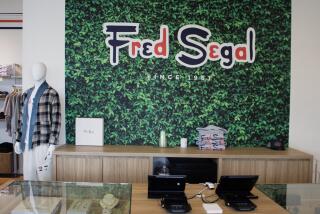Shelves Emptied, Another ‘60s Icon Is Just a Memory
- Share via
Security guard Johnny Franklin was prepared for a big crowd, but not the horde that descended on Fedco in Van Nuys on Wednesday for its last day in business.
“It was awful busy,” said Franklin, who was manning the front entrance. “People were grabbing the baskets and ramming them into the back of one another. I told them all to slow down. I haven’t seen people act like that, except at a concert.”
By late morning, the good stuff was gone. Electronics gear, jewelry, sporting goods--shelf after shelf was picked clean. The food department, where people once stood 10 deep in line to see a butcher, was barren. Still, hundreds of people prowled the aisles for the few bargains that were left.
“It’s horrible. I feel terrible, even though I’m scoring now,” said Doug Denike, a 40-year-old North Hollywood man stocking his basket with Star Wars toys marked down 90%. “My mom used to bring me here when I was 10 or 11. It’s like an old friend. We shopped here all the time. I hate to see it go.”
I know the feeling.
*
*
As a kid, I would be dragged along to this Fedco, too. Tucked in an industrial neighborhood, it was one of those heart-of-the-Valley places, like the Anheuser Busch brewery and the General Motors plant. This isn’t the same Valley you find along Ventura Boulevard or in the hills of Studio City--this is the Valley of auto body shops, roofing supply yards and metal recyclers.
To an earlier generation, there are fond memories of corner grocers and drugstore soda fountains. To kids who grew up in the ‘60s, in the Valley, there was Fedco.
In 1956, when the Van Nuys Fedco was built, the San Fernando Valley was like a company town for the aerospace industry. Lockheed, Litton, Hughes, North American Rockwell--in the late ‘50s and ‘60s these and a host of smaller companies with defense contracts were the anchor of the Valley’s economy.
Fedco was founded in 1948 to serve federal workers exclusively, but it gradually relaxed the membership rules. Employees of federal contractors such as the aerospace companies were among the first to be invited along.
Contrasted with the membership discount stores of today, where just about anyone can join by paying a fee, Fedco had a genuine air of being a special insiders club, making the low prices seem all the lower.
Other discount stores--Zody’s, Gemco, White Front--have come and gone, with few mourning their departure. But Fedco’s demise, in a small way, marks the passing of an era.
*
*
The store doesn’t seem so big now. To shoppers who have grown accustomed to the giant warehouse stores--stacked to the roof with everything from beef jerky to tires--Fedco is oddly quaint, like an old stereo. The ceilings are low, the food department is tiny compared to a modern supermarket and the merchandise shelves, display racks and general look of the place seem straight out of the ‘60s.
And, of course, that was the problem.
Just a few blocks away from Fedco, the Plant--a sparkling reinvention of the former GM factory as a retail center--offers a huge Home Depot, Office Max and other big-box stores. And the most successful retailer in America today, Wal-Mart, is just down the street in Panorama City.
In the back rooms of Fedco, in the employee-only areas, signs urged the workers not to patronize such competitors. But it was a losing battle, and the chain announced in July that it had filed for Chapter 11 bankruptcy protection and would shut down.
Low prices and store loyalty simply aren’t enough these days--merchants must also offer the right merchandise, good customer service and an inviting environment, said retail analyst Edward Weller of Sutro & Co. in San Francisco.
Target Stores, the Dayton Hudson Corp. division that is taking over the Fedco properties, is an example of a retailer that understands what today’s shopper wants, Weller says.
“I’m willing to bet that they’ll do twice as much business in the same box,” Weller said. “Target stores are just a much more pleasant place to shop,” he said. “They make it cheerful, fast, easy and cheap--what more could you want?”
But it’s not clear that the Van Nuys Fedco will ever become a Target. The company plans to reopen, at most, six of the 10 general merchandise Fedco stores as Targets, said company spokeswoman Patty Morris.
Morris said Target expects to decide by late October which stores will be converted. But I wouldn’t wager on Van Nuys being one of them.
Target likes to place its stores along thriving commercial corridors where they are plainly visible--often from nearby freeways.
The Van Nuys Fedco hides off a narrow, two-lane street in a gritty industrial neighborhood. The site worked fine for a retailer that billed itself as an insiders club--the hard-to-find location may even have been part of its appeal--but in the big tent retailing world of today, the parcel seems more suited for a carpet warehouse or a trailer storage yard.
Whatever happens, Fedco won’t be the last retailer to shutter its doors. Even now, shopping malls struggle to reinvent themselves as entertainment centers after finding that department stores alone won’t draw crowds anymore. And you can buy everything from a car to a quart of milk over the Internet.
The Targets and Home Depots of the world look pretty bulletproof right now, but history suggests that the day will come when they too will face the pain of a liquidation sale.
“It’s sad to see stores die,” said Weller. But die they must. Instead of funerals, they have close-out sales.
More to Read
Inside the business of entertainment
The Wide Shot brings you news, analysis and insights on everything from streaming wars to production — and what it all means for the future.
You may occasionally receive promotional content from the Los Angeles Times.











